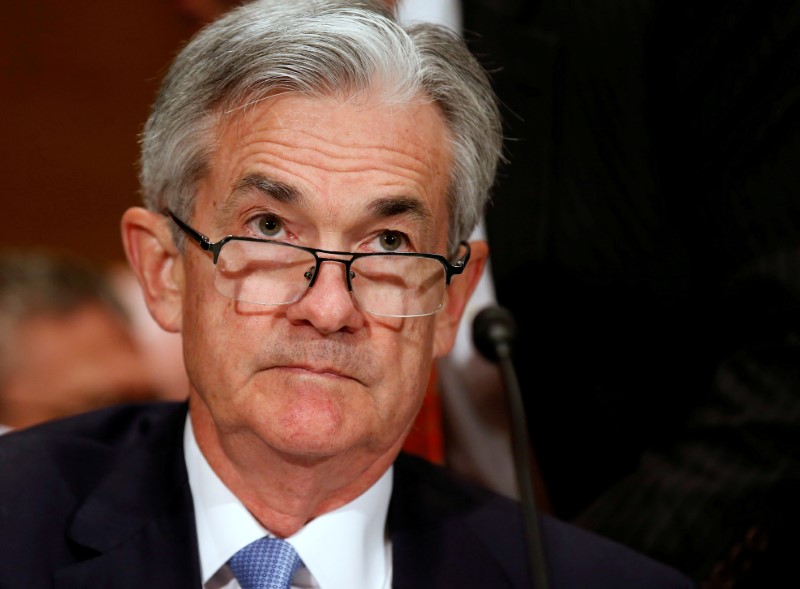This post was originally published on this site
https://i-invdn-com.investing.com/news/LYNXMPED9T103_M.jpg
1. The end of an era for the Fed?
“There is a sense that we’re much closer to the end of this than to the beginning.”
So said Federal Reserve chair Jerome Powell in a news conference after the U.S. central bank’s Federal Open Market Committee unanimously decided to lift interest rates by 25 basis points to above 5%.
It was the tenth-straight hike in borrowing costs for the Fed, but observers listening closely to Powell’s comments on Wednesday discerned that policymakers may feel that a pause to this tightening cycle could soon be at hand. With economic growth showing signs of sputtering and a credit crunch threatening regional banks (see below), the impact of the Fed’s campaign of rate rises aimed at corralling runaway inflation is starting to be felt.
Echoing that sentiment, the FOMC’s guidance was revised to say that new data and the overall effect of elevated rates would play a role in determining if additional increases are needed. Tellingly, Powell called this a “meaningful” change in its outlook. Time will tell if that means a pause is imminent.
2. PacWest weighs its options
The malaise in midsize U.S. lenders intensified on Wednesday, with Beverly Hills-based PacWest Bancorp (NASDAQ:PACW) becoming the latest bank to teeter on the edge of possible collapse.
In a statement, PacWest said it has been approached by “several potential partners and investors” in a bid to secure a financial lifeline, adding that these discussions are ongoing.
The comments came after shares in the bank dropped by more than 50% in after-hours trading following a Bloomberg report that it was reviewing its strategic options, including a potential sale. Citing people familiar with the situation, Bloomberg said that PacWest is working with a financial advisor to also explore a potential breakup or capital raise.
PacWest’s issues all but quash nascent hopes that the emergency acquisition of ailing First Republic earlier this week by JPMorgan (NYSE:JPM) would stem the most urgent crisis in the U.S. banking industry since 2008.
3. Futures muted ahead of Apple earnings
U.S. stock futures were subdued on Thursday, as investors digested the Fed decision and eyed the turmoil in regional banks.
At 05:12 ET (09:12 GMT), the Dow futures contract was up 13 points or 0.04%, S&P 500 futures were largely unchanged, and Nasdaq 100 futures climbed 40 points or 0.31%.
Waiting in the wings after U.S. markets close are earnings from technology giant Apple (NASDAQ:AAPL). The California-based company is expected to report a drop in sales for the second quarter in a row, with analysts projecting about a 5% dip in revenue due to weaker demand for its Mac and iPad products.
But these returns are not expected to keep the iPhone maker from unveiling a massive increase in its share buyback program. Reports suggest that analysts believe the repurchases, which are viewed as a proxy for the overall strength of the business, could be worth $90 billion.
4. A beat for Shell
Royal Dutch Shell (LON:SHEL) posted better-than-expected income in the first quarter, as Europe’s biggest oil and gas producer was boosted in part by strong fuel trading performance that helped offset easing energy prices.
Adjusted profit in the first three months of the year jumped by 5.7% compared to the same period last year to $9.65 billion, topping Bloomberg consensus estimates of $8.14 billion. Its chemicals and refined products division had a bumper quarter, with profit surging by 52% year-on-year to $1.78 billion.
Shell’s results mark the latest beat for the oil majors during this earnings season. Rivals BP (LON:BP) and Exxon Mobil (NYSE:XOM) both delivered higher-than-projected returns thanks to resilient demand that has helped to limit the impact of a recent retreat in oil prices.
Separately, analysts largely welcomed Shell’s decision to maintain its pace of share buybacks at $4 billion over the next three months. The repurchases have been a key pillar of chief executive Wael Sawan’s drive to close the valuation gap between Shell and its U.S. peers.
5. Decision day for the ECB
The European Central Bank is widely tipped to bump up interest rates at its latest governing council meeting on Thursday, but it remains to be seen if officials in Frankfurt will begin to back a gradual easing off on a recent monetary policy tightening cycle.
Inflation data out of the Eurozone this week has helped bolster the case for a more dovish approach from the ECB, which has made curbing price growth a top priority. Core prices – a key gauge of inflation for the central bank that strips out volatile food and energy prices – inched lower in April to 5.6%, although the reading remains well above the ECB’s stated 2% target.
Meanwhile, an ECB survey of lending data for March showed that banks were making it more difficult for borrowers to get their hands on credit.
With these developments in mind, analysts at ING predicted that the ECB will deliver “at least” two more hikes during its current rate-rise campaign: one by 25 basis points today, followed by a further additional increase at its next meeting in June.

